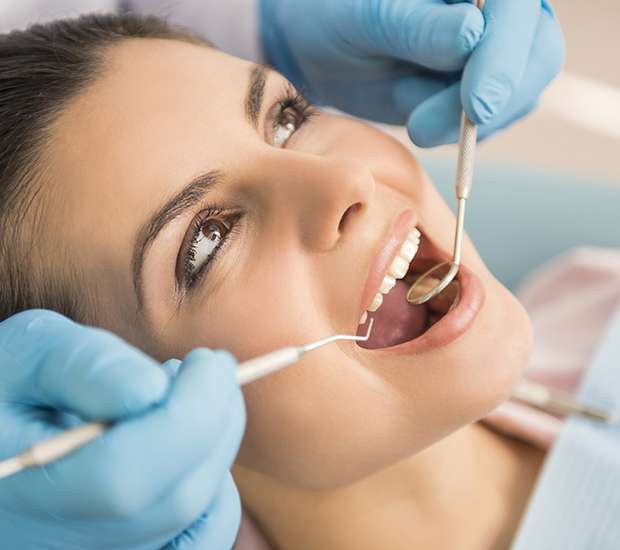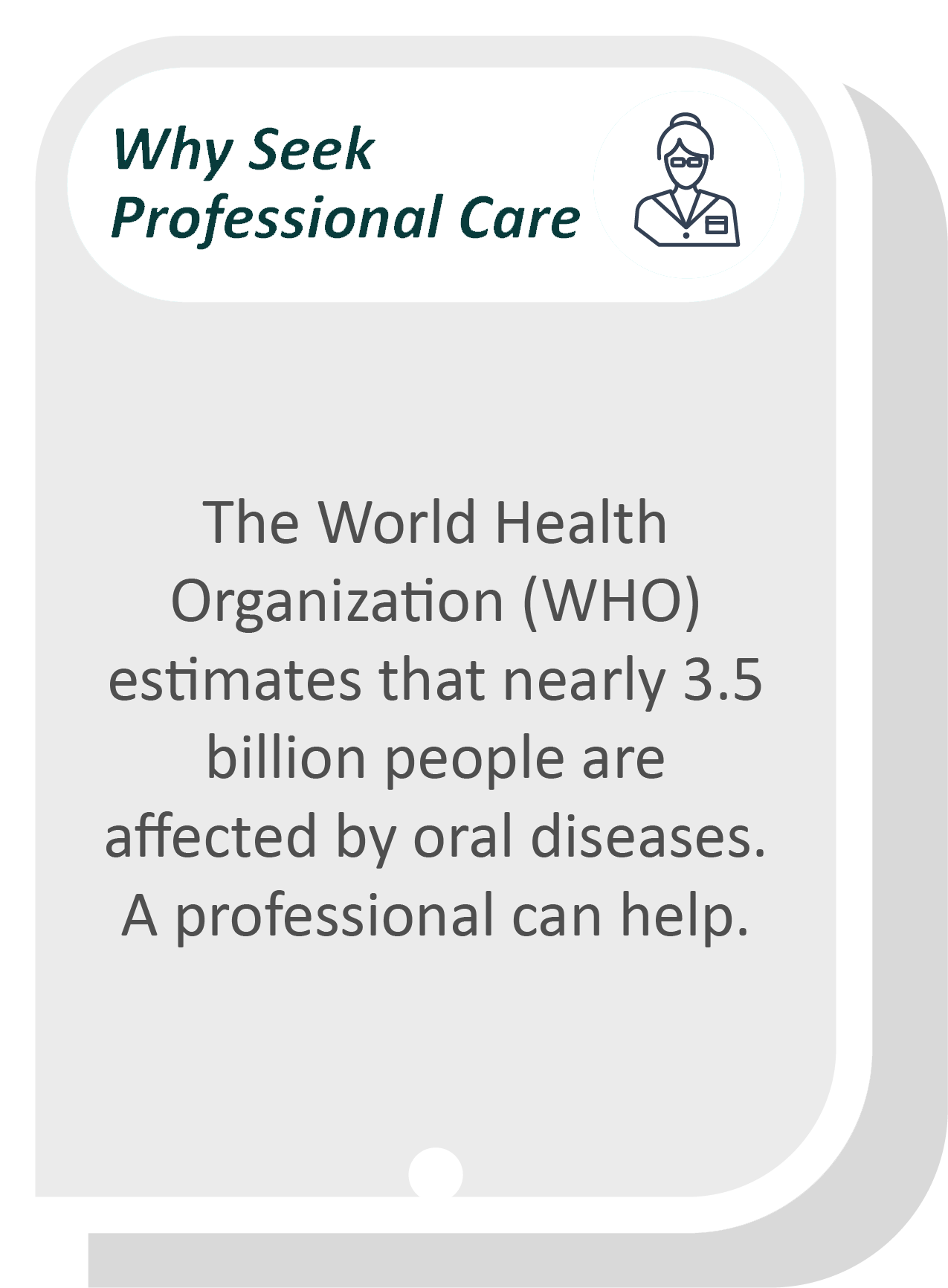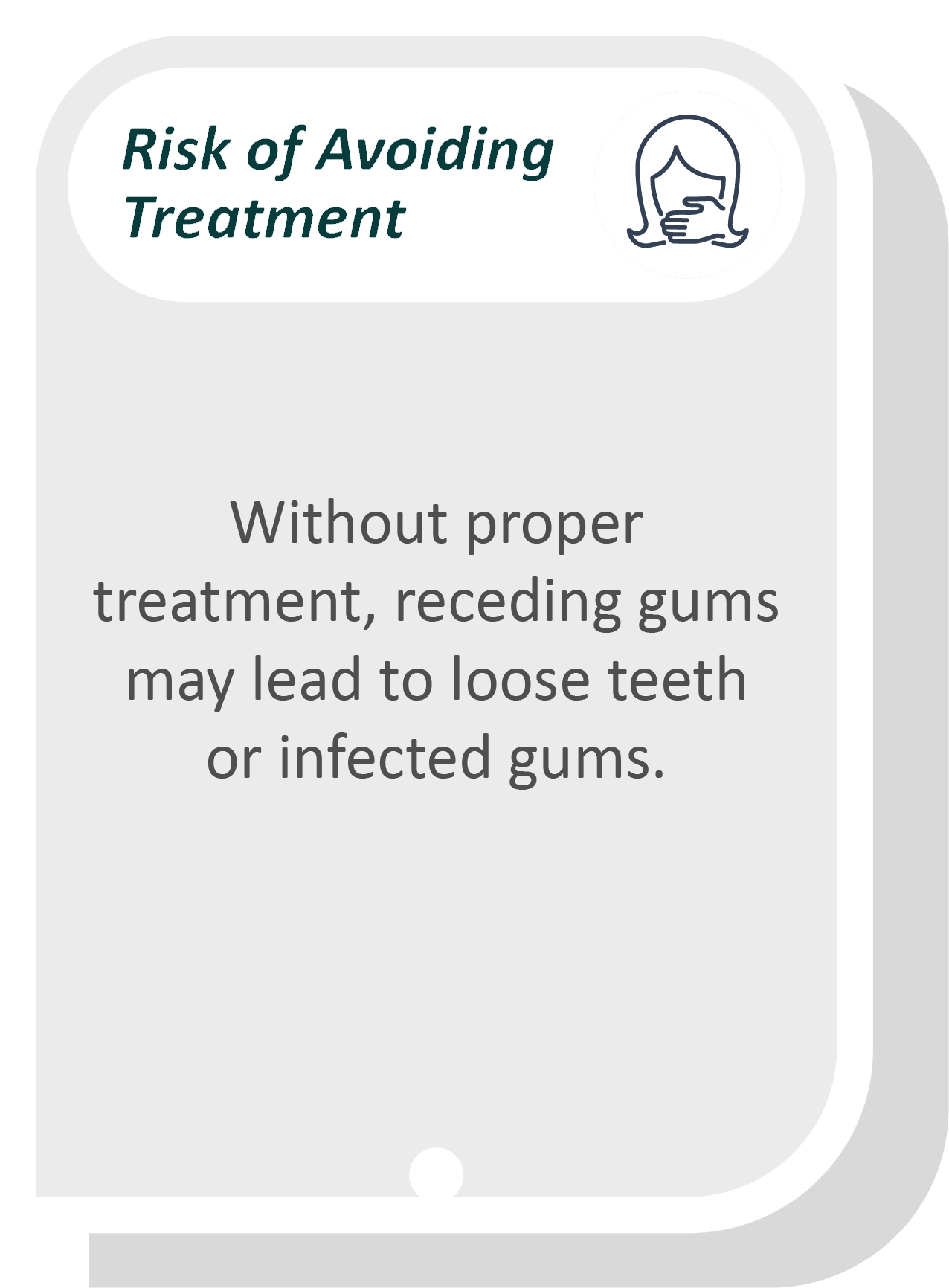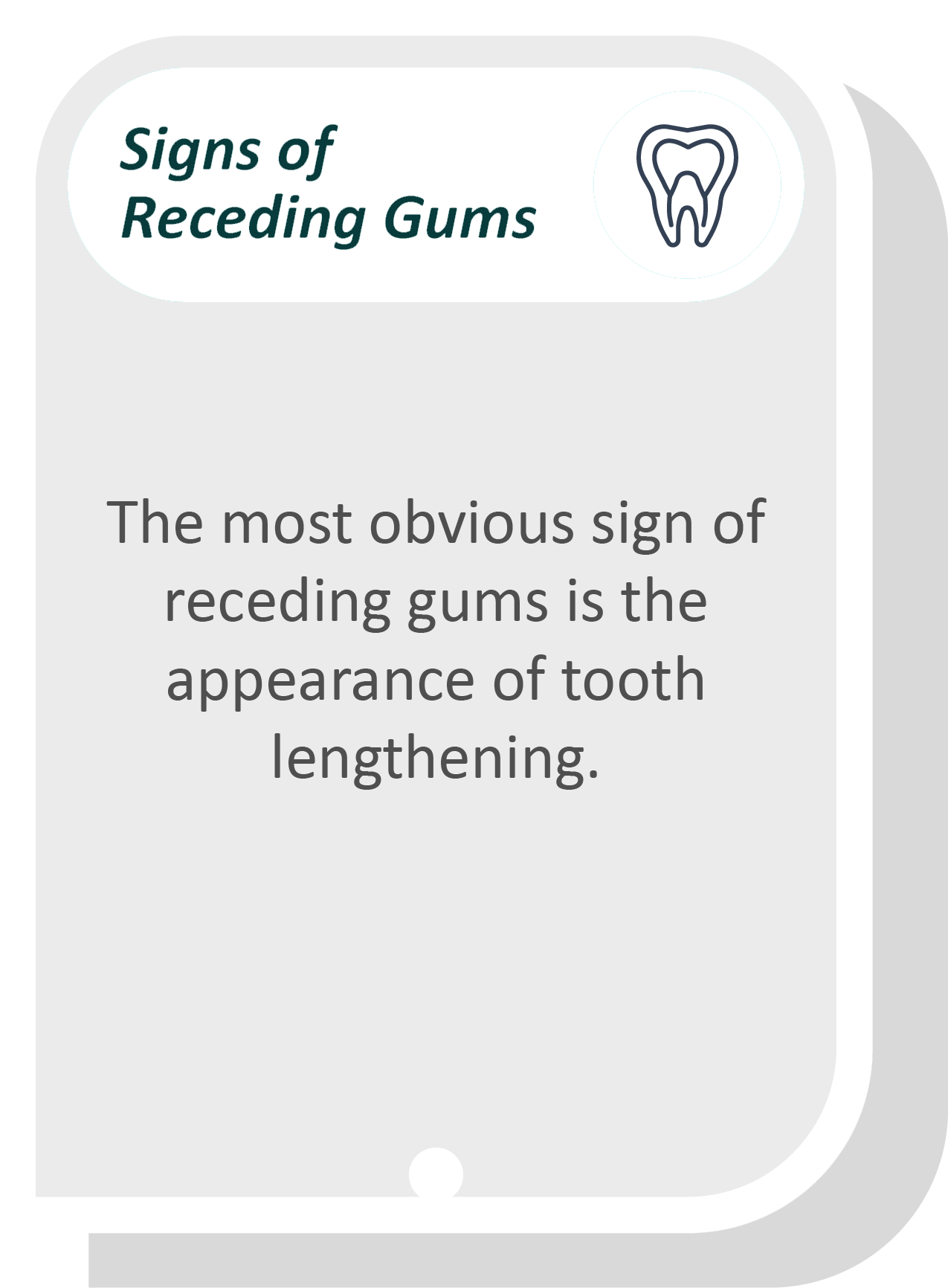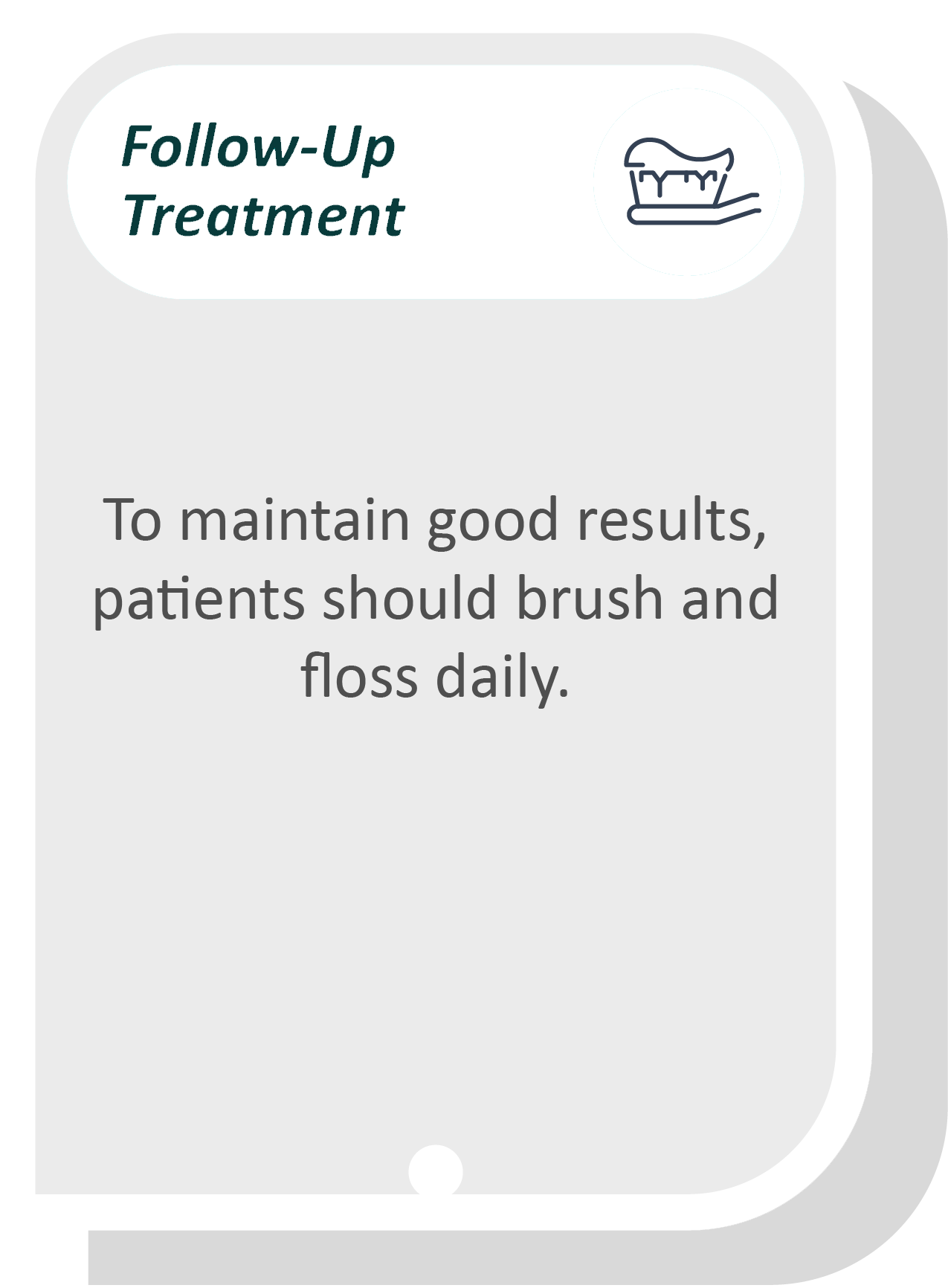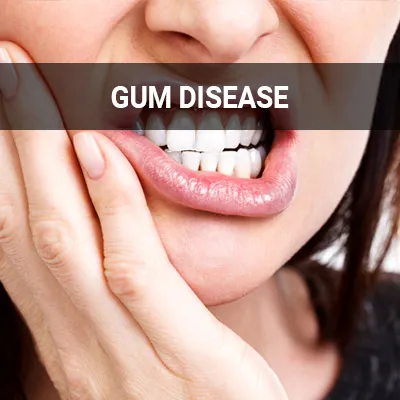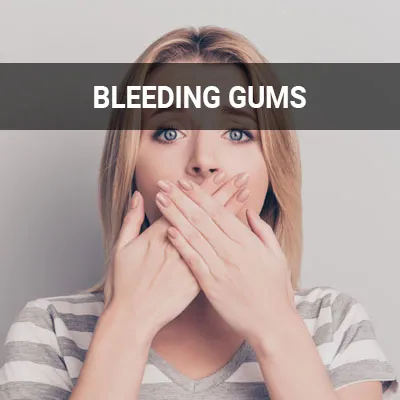I Think My Gums Are Receding Houston, TX
For many patients, solutions for gum recession can enhance both their appearance and overall dental health. Gum recession can happen even to people with good oral hygiene. There are many options available to treat receding gums.
Solutions for gum recession are available at Dental Bright in Houston and the surrounding area. Call us today at (713) 357-6355 to schedule an appointment and learn more.
Signs of Gum Recession
For some patients, gum recession may set in subtly and go unnoticed for some time. The aesthetic changes following gum recession are the most apparent. These include visibly shrinking gums and exposed tooth roots. However, other common symptoms include:
- Bad breath
- Bleeding after brushing or flossing
- Loose teeth
- Pain at the gum line
- Red, swollen gums
Patients may experience concerns about their appearance during this time, as well as a fear of losing teeth. Additionally, teeth may be particularly sensitive to cold and heat (due to the exposed tooth roots).
“The aesthetic changes that follow gum recession are the most apparent.”
Causes of Gum Recession
Several factors can cause a person's gums to recede, regardless of the state of their oral hygiene. These include aggressive toothbrushing, body piercing, clenching or grinding teeth, crooked teeth or a misaligned bite, hormonal changes, insufficient dental care, periodontal disease, and tobacco products. Genetics may also be a factor. For example, parents may pass down weak, thin gums to their children.
Some patients may also find that their gums are receding only on one side. Usually, this is due to plaque concentrating in one area of the mouth. This may be due to neglecting oral hygiene on one side of the mouth, as excess plaque and bacteria at the gum line may release toxic substances that destroy gum tissue. Alternatively, a misaligned bite may cause more wear and tear to one side of the mouth than the other. Gum recession may happen on only one tooth for similar reasons or some physical trauma.
“Several different factors can cause a person’s gums to recede, regardless of the state of their oral hygiene.”
Treating Gum Recession
Some cases of gum recession are mild enough that they do not need treatment. Still, several treatment options are available for those who need it. These include composite restoration; desensitizing agents, varnishes, and dentin bonding agents; orthodontics; pink porcelain or composite; removable gum veneers; and surgery. Composite restorations are natural-looking, tooth-colored composite resins that cover the surface of the tooth root. They may be used to close any black gaps between the teeth.
Desensitizing agents, varnishes, and dentin bonding agents may help reduce the exposed tooth root's sensitivity. By lessening the nerve symptoms, desensitizing agents may ease the brushing of sensitive teeth and promote oral hygiene. Orthodontics (or braces) are more of a long-term treatment that moves a tooth slowly over time. This repositioning can help correct the margin of the gum.
Pink porcelain or composite that matches the color of the gums can be applied to the "gaps" to reduce the appearance of receded gums. Similarly, removable gum veneers, which usually consist of acrylic or silicone, can be applied in the "gaps." Finally, more severe cases of gum recession may necessitate surgery, usually a gum graft.
“Some cases of gum recession are mild enough not to need treatment.”
Check out what others are saying about our dental services on Yelp: I Think My Gums Are Receding in Houston, TX
Preventing Gum Recession
Proper dental care is the number one way to prevent gum recession. This involves maintaining a routine where patients brush their teeth with a soft-bristled toothbrush at least twice daily and floss at least once daily. Patients should also see a dentist at least twice a year. At-risk patients may require more frequent visits, and a dentist that notices signs of gum recession may want to keep a vigilant watch that it does not worsen.
Patients may want to consider asking their dentist how to properly brush their teeth to ensure that they are not brushing too aggressively. Additionally, healthy lifestyle choices like eating a well-balanced diet and not smoking can lessen one's chances of gum recession dramatically.
It can be dangerous to leave gum recession untreated. Exposed tooth roots may decay very quickly, necessitating various expensive, painful procedures. Teeth may get more sensitive, and the appearance of the smile may become imbalanced. It is also possible that what patients are experiencing is not gum recession but undetected, worsening gum disease.
” healthy lifestyle choices like eating a well-balanced diet and not smoking can lessen one’s chances of gum recession dramatically.”
Questions Answered on This Page
Q. What are the symptoms of gum recession?
Q. What can I do about receding gums?
Q. How can I prevent gum recession?
Q. Am I at risk for receding gums?
People Also Ask
Q. Why would someone get gum reshaping?
Q. What should be included in an at home oral health routine?
Q. How do lifestyle choices affect dental health?
Risk Factors for Gum Recession
Certain populations may be more at risk for gum recession than others. For instance, age is a leading risk factor for receding gums, with almost 90% of people older than 65 reporting a receding gum in at least one tooth. Those who smoke or use other tobacco products also face an increased risk of receding gums, as they are more likely to develop sticky plaque.
Some genetic conditions, like thin or weak gums, may also increase one's chances of gum recession. Patients with diabetes may also be more likely to have their gums recede, as the disease might reduce the blood supply to the gums.
“Certain populations may be more at risk for gum recession than others.”
Frequently Asked Questions
Q. Is gum recession correlated with bone loss?
A. Yes. The bone around the tooth dissolves when the gum recedes. It is crucial to address gum recession right away to prevent further bone loss.
Q. Will gum grafting cover all my exposed tooth roots?
A. Some teeth are easier to treat with gum grafting than others. Teeth with long, exposed roots, fillings, or notches can be difficult to cover, as can teeth with lost bone between the teeth. Early treatment is key for optimum results. Our team can help go over the options with you.
Q. Can poor-fitting partial dentures cause gum recession?
A. Anything that causes excess wear and tear on the gums and jaw can contribute to gum recession. Contact us if you are unsure if your dentures are fitting correctly.
Q. How is gum recession diagnosed?
A. Our team will start with reviewing your medical history to identify any factors that could be causing or aggravating your symptoms. Then, you will undergo an examination to look for any plaque and tartar buildup, along with any easy bleeding. The dentist will then measure the pocket depth of the groove between your gums and teeth. If necessary, our team will take X-rays to check for any bone loss.
Q. Can gum recession cause me to lose teeth?
A. Yes. Gum recession involves the loss of attached tissue, which protects the tooth and gums from any foreign materials that can infect the bone. Losing the attached tissue leads to a significant loss of bone support for the tooth.
Gum Disease Terminology
Call Us Today
Gum recession can be stressful to experience. We at Dental Bright may be able to help. Call us today at 713-357-6355 to learn more and schedule an appointment.
Helpful Related Links
- American Dental Association (ADA). Glossary of Dental Clinical Terms. 2024
- American Academy of Cosmetic Dentistry (AACD). Home Page. 2024
- WebMD. WebMD’s Oral Care Guide. 2024
About our business, license, and website security
- Dental Bright was established in 2007.
- We accept the following payment methods: American Express, Cash, Discover, MasterCard, and Visa
- We serve patients from the following counties: Harris County
- We serve patients from the following cities: Houston, Sugarland, Missouri City, and City of Bellaire
- TX (License #18923). View License Information and Specifics
- National Provider Identifier Database (1194942888). View NPI Registry Information
- Norton Safe Web. View Details
- Trend Micro Site Safety Center. View Details
Back to top of I Think My Gums Are Receding
